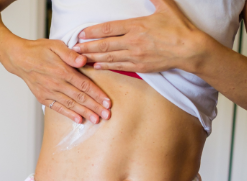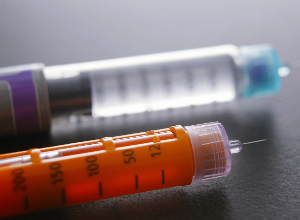Does smoking make psoriasis worse?
Published Jul 28, 2021 • By Candice Salomé
Tobacco is detrimental to our health, that's a fact. The health consequences are numerous: cancer, heart attacks, strokes, high blood pressure, COPD... Some studies have shown that smoking could also aggravate or even trigger psoriasis.
But what is the true picture? What is the link between smoking and psoriasis? Can quitting smoking improve psoriasis?
We explain it all in our article!

Psoriasis is a chronic autoimmune disease affecting the skin and/or scalp. It is characterized by the appearance of red, raised patches of skin covered with scales (whitish flakes that peel off the skin).
Psoriasis develops in flare-ups of varying frequency and intensity, interspersed with periods of remission that can last several years. The triggers for psoriasis flare-ups are varied: stress, a predisposing genetic background or an emotional shock.
Other causes exist and can aggravate a patient's psoriasis. Smoking is one of them.
How does smoking affect the skin?
Tobacco is harmful to our health (cancers, strokes, high blood pressure, COPD, etc.) and also affects the skin in different ways
It slows down the healing of the skin. Indeed, it takes smokers' skin longer to heal than that of non-smokers. Several substances present in cigarettes, such as carbon monoxide, reduce tissue oxygenation and maintain poor blood circulation.
In addition, smoking is a major contributor to premature ageing of the skin. On average, smokers are 4.7 times more likely than non-smokers to have more aged and marked skin, with the appearance of early wrinkles, reduced skin elasticity, dry skin and a greyish complexion. This premature ageing of the skin is due to reduced blood flow to the skin cells.
What is the link between smoking and psoriasis?
A firm link has been established between smoking and the development of psoriasis. In France, for example, the proportion of smokers among psoriasis patients is higher than in the general population (up to 50% vs. 22%). 70% of these smokers currently affected by psoriasis had started smoking before developing the disease.
Numerous studies have demonstrated this link between smoking and psoriasis. The latest is a study published in the International Journal of Clinical Practice in October 2020, in which two doctors from the Ankara City Hospital in Turkey deciphered the smoking habits of 133 patients with psoriasis. They were able to assess the impact of smoking on the characteristics of the disease.
The scientists found that 67.6% of the patients evaluated were smokers. Compared to non-smoking patients, the latter were more likely to have moderate to severe psoriasis and nail psoriasis, with fewer remission periods. A correlation between smoking, the number of cigarettes smoked, and the severity index of psoriasis could thus be demonstrated.
An older study from 2006, conducted in Italy among 818 adults affected by psoriasis, found that smoking worsened the symptoms of the disease.
At the same time as these results were published, American researchers were able to demonstrate a link between smoking and the onset of psoriasis.
In addition, the heaviest smokers (20 or more cigarettes per day) are more likely to have severe psoriasis, especially palmoplantar psoriasis (affecting the palms of the hands and soles of the feet).
However, the mechanism by which smoking may influence the symptoms or even cause the onset of psoriasis has not yet been determined. One thing researchers agree on is that smoking negatively affects the immune system.
Finally, smoking reduces the effectiveness of biological treatments for both psoriasis and psoriatic arthritis.
Can quitting smoking improve psoriasis?
There is scientific evidence that quitting smoking leads to a rapid improvement in palmoplantar psoriasis.
In addition, smoking cessation reduces the inflammatory activity of the body and decreases the risk of developing future cardiovascular complications of psoriasis: heart attack, hypertension, diabetes, etc.
The benefit of reducing the risk of cardiovascular co-morbidities is that it gives the patient access to more drug treatments for psoriasis. For example, hypertension, which is enhanced by smoking, is a contraindication to some psoriasis treatments.
Quitting smoking will therefore allow patients to be treated more effectively.
How to quit smoking when you have psoriasis?
Given the knowledge and evidence that smoking increases risk of developing psoriasis and can contribute to inflammation, which makes psoriasis more severe, it's important for doctors and psoriasis patients to have an active discussion about quitting smoking.
It is important to note that not all psoriasis patients see a change in their symptoms after quitting but stopping smoking can nevertheless contribute to improving overall health and quality of life. The immune system can respond positively to lifestyle changes such as diet and exercise and stopping smoking can play an important role in this change of behavior and habit.
Before quitting smoking, it is strongly recommended that you take stock and analyze your motivations: are you quitting for your health, for your loved ones, for your budget, etc. This way, you will have a clear objective in mind, and this will be a real source of motivation.
Then plan a quit date. This will give you time to prepare for quitting properly and without rushing.
You can try to quit on your own or with the help of nicotine replacement therapy (NRT). NRT helps to ensure that you don't experience too many withdrawal effects such as cravings or bad mood. Scientific studies have shown that nicotine replacement products are effective in helping you quit smoking: they increase chances of success by 50% to 70%.
They come in different forms: slow-release nicotine patches or fast-acting oral forms (gums, lozenges, etc.). Each product contains a varying dosage of nicotine and are available over the counter at pharmacies or on prescription from a doctor and may be available to you free of charge or may be covered by your insurance. To find out more about resources available to help you quit smoking, feel free to visit the CDC website here.
It is essential to identify "risky" situations that may tempt you into smoking (smoking at your coffee break at work with coworkers, after a meal, etc.) and to modify your habits to avoid giving in.
Finally, do not hesitate to ask a health professional for advice on how to stop smoking. Your doctor or dermatologist can help you take the first steps and guide you on your end-of-smoking journey.
Was this article helpful to you?
Feel free to give it a "like" and share your thoughts and questions with the community in the comments below!
Take care!
Sources:
- Liens entre tabagisme et psoriasis, Psoriasis Contact
- Tabagisme et psoriasis, Génération sans tabac
- The Negative Effects of Smoking on Psoriasis, Healthline
- How to Quit, CDC
- Videz le cendrier : voilà ce que fumer fait réellement à votre peau, Bien vivre ma peau
- Quelles sont les causes du psoriasis ?, Vidal

 Facebook
Facebook Twitter
Twitter


